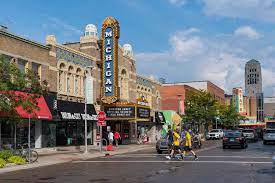Is cannabis legal in Michigan?
Medical marijuana has been legal in Michigan since 2008 when the Michigan Medical Marihuana Act was passed, allowing patients with qualifying medical conditions to purchase, use, and possess cannabis with a recommendation from a physician. They can also cultivate up to 12 plants for personal medical use.
In November 2018, Michigan voters approved Proposal 1, also known as the Michigan Regulation and Taxation of Marihuana Act. This law legalized the recreational use, possession, and cultivation of cannabis for adults aged 21 and older. It allows individuals to possess up to 2.5 ounces of cannabis in public and up to 10 ounces at home. Adults can also grow up to 12 cannabis plants for personal use.
Despite both medical and recreational marijuana being legal in Michigan, there are several benefits to having a Michigan medical marijuana card that will be covered below.

Who qualifies for the Michigan medical marijuana program?
Applicants for medical marijuana in Michigan must be residents of the state and provide proof of Michigan residency, such as a Michigan driver’s license or state identification card.
For a medical cannabis card, one must have a debilitating medical condition or one or more of the qualifying medical conditions:
- Cancer
- Glaucoma
- HIV/AIDS
- Crohn’s disease
- Chronic pain
- Multiple sclerosis
- PTSD (post-traumatic stress disorder)
- Seizures/epilepsy
- Severe nausea
- Any other condition approved by the Michigan Department of Licensing and Regulatory Affairs (LARA) (other qualifying conditions could include persistent muscle spasms, inflammatory bowel disease, Alzheimer’s disease, Rheumatoid arthritis, etc)
We recommend that all patients bring as many medical records as possible to support their history of living with one or more of the qualifying conditions.
How do get a medical cannabis card in Michigan?
In order to apply for a medical card, you will first need a written certification from a licensed physician who is registered with the Michigan Medical Marijuana Program (MMMP), which is the marijuana regulatory agency. This can be provided by Compassionate Clinics of America.
After reviewing the patient’s medical history during the medical evaluation for the certification process, the physician must confirm the patient lives with a chronic or debilitating disease or a qualifying condition and state that the potential benefits of medical marijuana outweigh the risks.
Applicants must then submit the necessary forms and documentation to the Michigan Department of Licensing and Regulatory Affairs (LARA), which includes a completed application form, a valid government-issued photo ID, a physician certification form, and the required application fee.
Once approved, patients receive a registry identification card (the marijuana card in Michigan), which allows them to obtain medical marijuana from licensed dispensaries and cultivate a limited number of plants for personal use.
What are the benefits of having a medical marijuana card?
Having a medical marijuana card offers several benefits to individuals who qualify for the state’s Medical Marihuana Program (MMP).
Advantages include legal protection under Michigan law to posses, use, and cultivate cannabis for medical purposes without criminal penalties.
Medical cannabis patients may also purchase specific medical marijuana products that have been curated for medical outcomes by medical marijuana dispensaries.
Having a medical marijuana card in Michigan can provide certain employment protections, such as being granted legal safeguards against discrimination based on a medical condition or marijuana use, depending on the employer’s policies and state laws.
Another large benefit for medical marijuana patients in Michigan is that they are exempt from some medical marijuana taxes. Michigan consumers are required to pay a 6.00% sales tax on every purchase of medical and recreational marijuana. However, there is an additional 10% excise tax that is charged on recreational cannabis in Michigan. Medical patients in Michigan do not have to pay the additional excise tax.
How much does it cost for a medical card in Michigan?
The cost for a medical cannabis certification and a visit to one of Compassionate Clinics of America’s medical marijuana doctors in Michigan is $139.
The renewal fee for a medical cannabis certification is $99.
We offer Sezzle payment options to break up the cost into separate, affordable payments.
The Michigan marijuana regulation agency has a patient application fee (for a two-year card) of $40.
Do I need a doctor’s referral to get a Michigan medical marijuana card?
Yes, getting a licensed medical marijuana doctor, who is registered with the MMMP to provide you with a MMMP Physician Certification form is the first step to getting a medical marijuana card in Michigan. This can be provided by the knowledgeable doctors at Compassionate Clinics of America. Schedule online today for your appointment that is done over video call.
Once a licensed medical marijuana doctor has reviewed your medical history and has deemed it appropriate for you to have a medical card in Michigan, they will write you a written certification called at MMMP Physician Certification form that you can use for the medical card application process.
What information and forms are required when a patient applies for a Medical Marijuana ID card?
To apply, you must submit proof of residency and have the following documents ready:
- completed application form,
- a written physician certification (MMMP Physician Certification Form),
- proof of residency in the state of Michigan, and
- the $40 application fee
You will apply for a medical marijuana card through the LARA online portal, and you’ll have to create an online account.

How long is my ID card valid in Michigan?
A medical marijuana card in Michigan is valid for a period of two (2) years. When you work with Compassionate Clinics of America, we will remind you well in advance when it is time renew your card.
We will be happy to work with you to fill out the MMMP Physician Certification form, and you can visit a different doctor than the one who first certified you. When can I renew my ID card? Recertification only takes a few minutes.
You can renew your card up to 60 days prior to its expiry. We recommend medical cannabis patients ensure that they visit an mmj doctor prior to the expiry date of med card to ensure that they are not without the ability to legally purchase medical marijuana.
What is required for renewal?
To renew, existing patients will be required to have a secure online account with the MMMP, as well as a new medical evaluation from an active Michigan physician within the last six months who will certify your need for medical marijuana.
I’ve heard that I can get a medical cannabis card renewal in Michigan for $20. Where can I renew my Michigan medical cannabis card for $20?
Please be advised that no providers in Michigan exist who will renew your medical cannabis card certification for $20.
The cost to renew your medical cannabis certification and card with Compassionate Clinics of America is $99, and we are with you every step of the way.
If you are not approved for recertification, these fees will be wholly returned to you.
I live in another state, can I apply?
You have to have Michigan residency to apply to the medical marijuana program, however, Michigan is among the states that offers cannabis reciprocity, meaning, that if you have a medical marijuana card from another state, you will be able to purchase medical marijuana at a licensed medical dispensary.
Can I use medical marijuana anywhere in Michigan?
According to Michigan law, you may only use cannabis in a private place, such as in your own home, at a licensed designated consumption establishment or licensed marijuana temporary event. It is illegal to consume in public areas, such as on the street or at the park.
Landlords and/or business owners can decide to prohibit smoking tobacco or cannabis on their premises.
How much cannabis may I possess?
In Michigan, the state allows any adult to possess up to 2.5 ounces of marijuana on their person, with up to 15 grams of it being marijuana concentrate.
A resident is allowed to possess up to 10 ounces of cannabis for medical use at their residence but any amount over 2.5 ounces must be kept in a container until use.
Possession of more than 2.5 ounces of marijuana and up to 5.0 ounces of marijuana is a civil infraction punishable by a maximum fine of $500 and forfeiture of the marijuana for a first offense.
An adult may transfer up to 2.5 ounces of marijuana to another adult as long as there is no remuneration and the transfer is not advertised or promoted to the public.
Michigan now allows citizens to grow marijuana even if they are not medical marijuana cardholders. Adults 21-years-old or older may now legally grow up to 12 plants.
How long does it take to process my application for a Michigan medical marijuana card?
Once your completed application has been submitted, it usually takes about 2 weeks to receive your MMMP card in the mail, but you can use your approval email as a temporary card to begin your medical marijuana treatment immediately. See below for more details.

Will I be given a temporary card while my application is being processed?
Yes!
As soon as you receive your approval from the Michigan Marijuana regulatory agency, that approval email acts as a temporary substitute for a valid registry card in order to obtain their medication the same day you are approved.
This approval email is valid until you receive your card in the mail or for up to 15 days from the date of the approval email.
A valid driver’s license or government-issued identification card with a photographic image is also required to purchase medical marijuana.
Can I apply to be a caregiver for someone else?
You can become a medical marijuana caregiver in Michigan to qualifying patients designated under the MMP. Caregivers must complete the caregiver application form provided by the Michigan Department of Licensing and Regulatory Affairs (LARA). This includes submitting personal information, background checks, and paying the required application fee.
Caregivers in Michigan are allowed to provide assistance to a maximum of five registered qualifying patients at a time. It is important to note that caregivers can only serve patients who have designated them as their primary caregiver. Caregivers in Michigan can grow up to 12 marijuana plants for each patient they are designated to, but the total number of plants they can cultivate cannot exceed 72 plants.
Approved caregivers will receive a registry identification card. This card grants caregivers legal protection and allows them to possess and transport medical marijuana on behalf of their designated patients.
Can I own a gun if I have a medical cannabis card in Michigan?
As per the Michigan Cannabis Regulatory Agency, the Medical Marihuana Facilities Licensing Act (MMFLA) does not impose any restrictions preventing a concealed pistol license (CPL) holder from obtaining a state operating license for medical marijuana.
Can a doctor complete a medical marijuana certification via telehealth?
Yes! Meeting with a medical marijuana doctor from Compassionate Clinics of America is done all over video call. You can talk about your concerns, and ask any questions about medical cannabis from the comfort of your own home!
Questions About Medical Cannabis Certification in Michigan?
Feel free to connect with us anytime at [email protected] or call us at (888) 611-4820.
For Frequently Asked Questions specific to the Michigan medical cannabis program, visit their website at the link below:
Cannabis Regulatory Agency FAQ (scroll down for patient/caregivers FAQ)

